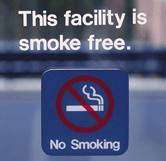Majority of biggest U.S. cities now smoke-free

(HealthDay)—Thirty of the 50 largest cities in the United States are now smoke-free, a new report shows.
The 60 percent of large cities that are smoke-free have laws that prohibit smoking in all indoor areas of private workplaces, restaurants and bars. In late 2000, only one of the 50 largest U.S. cities—San Jose, Calif.—had such a comprehensive smoke-free law.
As of Oct. 5, 2012, 16 of the 50 largest cities were covered by local smoke-free laws, and 14 more were covered by state smoke-free laws, according to the U.S. Centers for Disease Control and Prevention researchers.
Currently, nearly half of Americans are protected by state or local smoke-free laws, compared with less than 3 percent in 2000, the researchers said. New local smoke-free laws continue to be implemented in a number of cities and counties, but states are moving more slowly. Last week, North Dakota voters approved the first statewide smoke-free law adopted since 2010.
Research shows that smoke-free laws reduce exposure to secondhand smoke, reduce smoking, reduce heart attacks and improve health, according to the study in the Nov. 15 issue of the CDC's Morbidity and Mortality Weekly Report.
"Communities have made tremendous progress eliminating smoking from work sites and public places in 60 percent of big cities in the United States. Smoke-free laws save lives and don't hurt business," CDC Director Dr. Thomas Frieden, said in an agency news release.
"If we can protect workers and the public in the remaining 20 largest cities, 16 million people would be better protected from cancer and heart disease caused by secondhand smoke," he added.
Ten of the 20 largest cities without comprehensive smoke-free laws are in the South. In addition, 10 of those 20 cities are in states that prohibit local smoking restrictions from being stronger than or different from state law, the study found.
"Hundreds of cities and counties have passed their own smoke-free laws, including many communities in the South," Dr. Tim McAfee, director of CDC's Office on Smoking and Health, said in the news release. "If we continue to progress as we have since 2000, all Americans could be protected from secondhand smoke exposure in workplaces and public places by 2020."
More information: The American Lung Association has more about secondhand smoke.
Copyright © 2012 HealthDay. All rights reserved.














